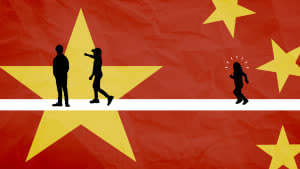China's 3-child policy isn't a demographic improvement. It's a moral one.

China's announcement this week that all married couples can have three children — up from two as of 2015 and just one before that — is unlikely to reverse the severe population decline forecast for the rest of this century, demographers say. The 2015 liberalization only increased Chinese birthrates for two years before the downward trend resumed. If this shift has a similarly small effect, China could have half as many people by 2100 as it has today.
But even if it doesn't move large-scale demographic trends, the three-child policy should make two significant changes.
First and most importantly, it will mean fewer forced abortions and sterilizations, fewer abandoned infants (most of them little girls or sick or disabled) and "illegal children." The cruelty of the stricter rules was incredible. "[S]ometimes pregnant women tried to run away" from forcible, even full-term abortions, and "we had to chase after them," a former official told filmmaker Nanfu Wang in her 2019 documentary, One Child Nation.
"Many I induced alive and killed," said a midwife. "My hand trembled doing it." That single midwife estimated she had personally performed 50,000 to 60,000 state-mandated sterilizations and abortions. A three-child policy is far from complete freedom, but it is better than that monstrosity. It will save and change lives, particularly for Chinese women.
The second change this policy should bring is an end to Western dissembling about the horror of the one-child policy. Some American politicians and pundits have a disgraceful record of tacit acceptance (or, worse, outright admiration) of the single child rule, as Jacob Sullum recounts at Reason. The most galling item on Sullum's list: comments from then-Vice President Joe Biden on a visit to China in 2011.
"I was talking to some of your leaders" about deficit spending and social safety nets for the elderly, Biden said. "Your policy has been one which I fully understand — I'm not second-guessing — of one child per family," he continued. "The result being that you're in a position where one wage earner will be taking care of four retired people. Not sustainable."
His math checks out, but that's far from the only problem China's restrictions on childbearing produced. A state policy that coerces unknown millions of women into abortion, sterilization, and terrorized abandonment or concealment of their children definitely should be "second-guessed."
